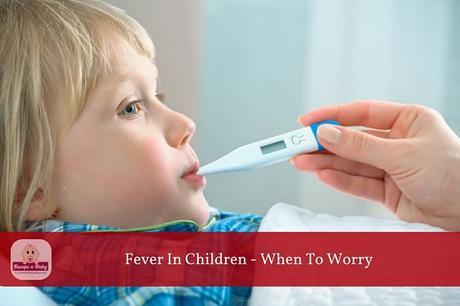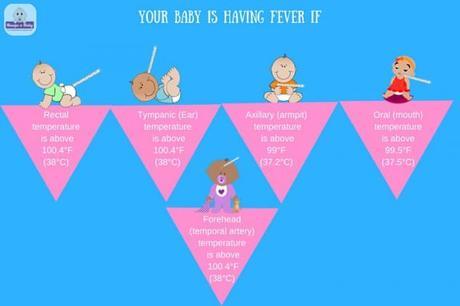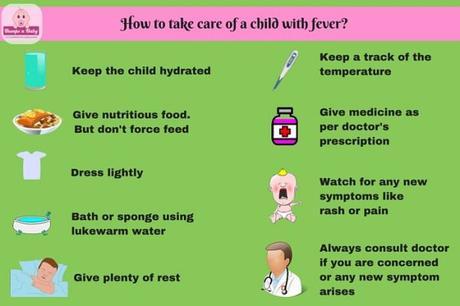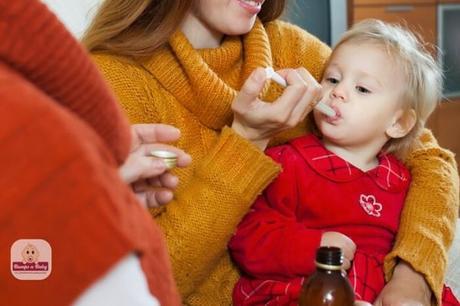Is fever in children something to be worried about?
How to look after a kid with fever?
What is high fever in children?
When to call a doctor when your child is down with fever?

Fever is one common illness that occurs to everyone. There will be not even a single person on earth who hasn't caught a fever in his lifetime.
Though a common illness, when our child is down with fever we parents panic.
If the baby is running a fever should we be really worried?
When to be concerned about a fever depends on the nature of the fever and the reason behind the fever. To know if a fever is nothing to worry about or something more serious requiring an immediate medical attention, we should first know what fever is and what the red flags during fever are.
In today's post we will see in detail all you need to know about fever.
What is a fever?Fever as you all know is a condition in which a person's body temperature is higher than normal. Fever is called pyrexia.
Fever is a symptom caused due to a wide variety of illnesses.
The hypothalamus in our brain is responsible for maintaining our normal body temperature which is around 98.6°F / 37°C. This temperature can slightly vary throughout the day depending on the time, climate and physical activity of the person.
But sometimes the hypothalamus decides to raise the temperature above a certain level in response to an illness, infection or some other cause. The raise in temperature helps to fight against the bacteria/virus that causes the infection by making our body a less suitable place for the germs to survive. This raise in temperature is what we call fever.
What are the causes of fever in children?
Fever as said before is not a disease by itself but a symptom that accompanies any other illness.
The following can trigger a fever in your child-
When there is an infection in our body, either by a bacteria or virus , the body raises its temperature to fight against these infection causing germs. So infection is one common cause for fever.
Vaccinations can cause a low-grade fever in children.
You can also read about thevaccination schedule in India.
If your child, especially newborn is over dressed or is in a hot environment, it can cause fever. Newborns cannot regulate their body temperature properly.
Teething can also cause a mild rise in temperature but this rise in temperature is normally bellow 100°F.
What temperature is a fever?Normally the first step to discovering fever in children is by touching his/her body. This is called tactile temperature.
By placing your hand on the kid's forehead or cheek or hands can help you feel if the child's temperature is normal or not. Tactile temperature can give you a hint that the child's temperature is high but cannot give you a measure of how high the temperature is.
A reliable thermometer is to be used to find out the accurate temperature. When using a thermometer, what temperature to be considered as fever depends on the kind of thermometer too, i.e. from which part of the body we are measuring temperature. This is because oral, rectal, ear and armpit temperatures vary slightly.
We often consider 98.6 °F oral temperature as normal body temperature.
The temperature in the rectum is 0.5°F (0.3°C) to 1°F (0.6°C) higher than the temperature inside the mouth.
Temperature taken from the ear, i.e. tympanic temperature is 0.5°F (0.3°C) to 1°F (0.6°C) more than an oral temperature.
An armpit temperature, i.e. temperature taken using an axillary thermometer is usually 0.5°F (0.3°C) to 1°F (0.6°C) less than an oral temperature.
Due to this difference in temperature, the temperature above which it can be considered as fever also varies depending on whether you are taking oral, rectal, axillary, or tympanic temperature.
Below list gives you the temperature above which it is considered fever when taken using different types of thermometers.
- Oral thermometer - 99.5°F (37.5°C)
- Rectal thermometer - 100.4°F (38°C)
- Axillary (armpit) thermometer - 99°F (37.2°C)
- Tympanic (Ear) thermometer - 100.4°F (38°C)
- Temporal artery( Forehead) thermometer - 00.4°F (38°C)

A rectal thermometer is considered to be the most accurate for infants and kids up to 4 years and an oral thermometer for kids above 4 years. But you can use an ear thermometer/ armpit thermometer too.
Ear thermometer is not recommended for kids below 6 months as their ear canal will be very small.
As said before, fever helps to fight infection. So in a way fever is good and shows that your body's immunity is working fine. So should we let the fever to run its course?
Should we always try reducing a fever or let it run its course?Well it depends on how high the temperature is and how comfortable your child is.
Some researches suggest that a fever less than 102°F for kids above can be left as such if the child is acting normal and is his/ her self. They say that this will help fight the underlying infection.
But if your child is not feeling comfortable or if his temperature is higher, then it is always best to cut the fever.
Your doctor will decide, after evaluating your child's condition, whether or not to give a fever reducing medicine. Plenty of rest, amble fluid intake and proper food will be enough if the child is comfortable and if the fever is mild.
Not all fevers are serious. Fever between 100°F and 102°F is considered low grade fever and is not generally harmful.Fever can be due to a common cold or cough or a diaper rash too. Sometimes fever can be an indication of a serious underlying issue or it can be because of nothing but a common cold.
At what temperature fever is considered serious?How serious a kids fever is doesn't depend solely on how high the temperature is. It also depends on the age of the kid, his behavior, how tired he or she is, how many days the fever is running and other symptoms that come along with fever.
Most fevers can be treated at home itself by giving plenty of fluids, keeping the child comfortable and taking over the counter fever reducers.
When to call your child's pediatrician?You need not worry much if
- Fever is less than five days, mild and your child is behaving relatively normal. He is eating, playing and sleeping normally but may be a little tired than usual.
- It is a low grade fever after immunization
- Your child is above 1 years is behaving normal even if the temperature is below to 102°F
Give a call to your doctor in the above cases and give proper medication and rest.
Visit your child's doctor if #1. Your baby is younger than 3 months and has feverCall your doctor is your child is less than three months and has a rectal temperature of 100.4°F and above.
Fever can be serious for kids less than 3 months even if the rise in temperature is not much. Fever may be the only way for babies this young to give a hint about any serious infection.
#2. Child is between 3 to 12 months and has a fever above 101°FIf you child is running a fever above 101°F and is between 3 to 12 months better to call the doctor.
#3. Fever is running for more than 5 daysA normal fever should go off with in 2 to 3 days. If your child's fever, even if a low grade one with or without any other symptoms, is running for more than 5 days it requires further investigation.
#4. Has temperature above 102.2°F for older kids with or without symptoms
If your child above 1 year has a temperature of above 102.2°F call doctor.
Sometimes even if there are no other symptoms like a running nose or cough, fever above 102.2°F even for 24 hours can warrant a serious illness.
Sometimes diseases like meningitis, urinary tract infections, or bacteria in the bloodstream can cause high fever in children with no other symptoms. So if temperature is above 102.2°F visit the doctor.
#5. Fever after immunization is above 102°F or is for more than 2 daysIf your child is recently immunized and has a fever more than 102°F due to immunization or if the fever after immunization lasts longer than 48 hours seek medical attention.
#6. Have any other symptoms along with feverCall your doctor if the child is having any illness along with fever even if the temperature is less, because the underlying disease is to be treated to get rid of fever.
Along with fever if your child has any of these below symptoms seek medical attention even if the fever is less.
- If your child is not drinking fluids ( eating less is ok)
- Seems dehydrated - less urine, no tears, dry lips or dry non-elastic skin.
- Is vomiting
- Is having loose motion
- Is complaining headache, sore throat or ear pain
- Fever not reducing even after giving fever reducers
- Has developed a rash
- Fever is less and for short span but is occurring every night
- Has pain while urinating
- Already has a chronic disease like heart disease, cancer etc.
- On and off fever that is more than a week
Even if the temperature is not so high or your child seems ok, but your motherly intuition says something in wrong, then you should always visit a doctor .
Seek emergency care if along with fever- Your baby is crying non stop
- Is not waking up from sleep
- Seems extremely tired and is less responsive
- Is extremely fussier and irritated
- Color of lips, nails or tongue is blue
- Soft spot on your baby's head is bulging outward
- Soft spot on your baby's head is sunken inwards
- Has abdominal pain
- Has seizure
- Has a stiff neck
- Has difficulty in breathing
- Is not moving or seems limp
- Purple spots on skin
- Has a severe headache
Febrile seizures or fits that occur with fever are one complication that can occur to your child when temperature rises immediately. Note that not all high fevers cause fits.
Fits due to fever usually involve eyes rolling up, foam from mouth, shaking/jerking of the body and loss of consciousness.
Although alarming, majority of febrile seizures doesn't cause any long lasting effects.
If a seizure occurs:
- Lay your child on his or her side
- Remove tight clothes and give proper ventilation
- Don't give anything orally till seizure episode stops
- Give his fever medication after the seizure stops
Take your child to the doctor immediately after the seizure.
You can also read Is Febrile Convulsion Normal in Babies?
A fever in children can damage the brain if it is as high as 107.6°F. Don't panic, this is extremely unlikely to happen and very rare. Even fever from serious infections can go only as high as 105°F. But if a feverish child is trapped in a hot place, is having a heat stroke or is overly dressed, chances are the temperature can shoot up to 107°F.
To avoid such unlikely situations, always keep recording your baby's temperature when he has fever and if fever is above 102°F consult the doctor. Avoid over dressing and keep the room temperature comfortable to avoid worsening an already high fever.
How to take care of a feverish child?When you have a child with fever looking after him in the proper way is important.
If you have breastfeeding child, breastfeed frequently to keep him hydrated.
For older kids give plenty of fluids. Dehydration can worsen fever so keep the fluid intake high. Give medications timely and in correct dosage as per your doctor's prescription.
Give proper nutritious foods that are easy to digest to help fast recovery from fever. While preparing food for your feverish child, keep in mind the underlying disease/infection that has caused the fever and give food accordingly.
Read:Dress lightly and comfortably. Don't over dress. Overdressing increases body temperature further. Keep the room temperature comfortable and keep the room well ventilated.
Try bringing down the temperature by sponging him with lukewarm water or by bathing him in lukewarm water.
Let your child stay home and not attend school if he has fever. This is important because your child needs plenty of rest when he has fever. Again keeping him at home helps you to find out if any new symptom warranting medical attention is developing in your child. Also we don't want to spread the infection to his classmates.
Monitor the child's behavior and note down the temperature at least 2 to 3 times in a day and seek medical care if needed.

Sponge bath can be given if the fever reducing medicine is not bringing down the fever.
A sponge bath is usually recommended if the fever is above 104 or if the child is really uncomfortable with the fever even if less than 104.
To give a sponge bath, use lukewarm water, i.e., water between 90°F (32.2°C) to 95°F (35°C). Take a soft cotton cloth or sponge and dip it in water and sponge for 20 to 30 minutes. Stop sponging if the child shivers or is resisting too much.
Sponging can help reduce the fever by 1 to 2 degrees in 30 to 45 minutes.
Never use cold water or rubbing alcohol. It can decrease the temperature suddenly and can cause more harm than good.
Precautions while taking fever medicationsFever is so common an illness that most of us use self-medication when there is a fever episode. But this is not the safest way.
If your child has any other symptoms like loose motion, cold or cough or vomiting along with fever, consult a doctor to find out what medicine is to be given. In such cases a fever reducer medicine is not effective, but a medicine to treat the underlying disease is to be taken. So consult a doctor.

An acetaminophen or ibuprofen is the medicine we usually use as a fever reducer. Please don't give these medicines if you are not sure of the dosage. Dosage depends on age and weight of your child. Always talk to a doctor in detail about how to handle your child's mild fever at home whenever the child has one.
Also never give any medicine for more than the recommended days.
Don't give more than one type of fever reducer medicine at a time or with in short interval of time unless told by your doctor.
If your child is already on any other medication, don't give fever medicines without doctor's prescription. This is because many medicines will have ibuprofen or acetaminophen content in them and giving fever reducers on top of such medicines can cause a ibuprofen or acetaminophen overdose.
If your child is below 3 months never give any fever medicines without seeing the doctor.
Aspirin should not be given to kids as it can cause a rare but potentially fatal disease called Reye syndrome.
So these are the fever protocol for children to be followed for fast recovery. Hope this helped.
How do you manage fever in children? Do you panic?
Which foods do your give when your child is down with fever? Share with us in comments.
